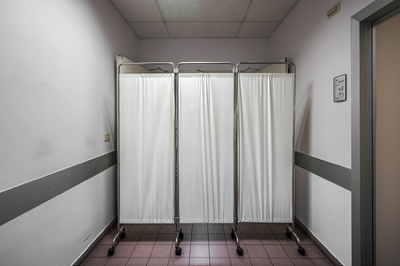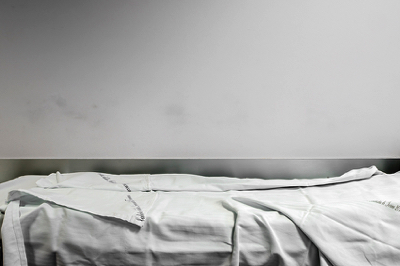Il Re muto
new medical journal
installation | archival print/Hahnemuhle Paper/ Photo Rag Matt | photographies variable size | postcards | texts |edition of 3 + 3 set box | 2017/2018-2022
© all rights reserved | 2022 | Antonio La Grotta



Re muto. New medical journal is a fake magazine in cancer research and oncology, rich of scientific literature and pictures.
The investigation begins with a reportage in some hospitals, where machinery, furniture and even colors recall the emotional memory of each of us, who shuns the idea of the hospital as a place of care and instead searches for the other: the innovative, gentle care, far from the needle that pricks the skin or from solitude under the merciless neon light.
Through a mix of images of both real and depicted nature, collected over time in a variety of places, I help to give truth to written texts that promise almost miraculous and non-invasive cures so far removed from official diagnostic and laboratory medicine.
You don't know if the studies, which are published in this journal are good, worthless, or bad, because you cannot be sure if and what kind of editorial process or peer review takes place there. But this is a medical journal and you are supposed to believe in it.
All these texts of methods of cancer management (abstract) have been selected by A Cancer Journal for Clinicians. Unproven Methods of Cancer Treatment.
(Publisher: John Wiley and Sons)
In 1955, the American Cancer Society established a commitee that served as a central coordinating force for tracking and evaluating dubious methods of cancer management. The commitee originally referred to these methods as "unproven".
In 1991, the society switched to the term "questionable", which would not include new methods that are being studied responsibly. Today the Society uses the term " alternative and complementary methods", which include a few methods that could conceivably turn out to be useful.
Re muto ( silent king ) is an anagram of tumore (tumor).
Medical journals publish many different types of papers that inform doctors about the latest research advances and the latest treatments for their patients. They publish articles that describe laboratory-based research into the causes of diseases and the identification of potential new drugs. They publish the results of early clinical trials in which a few patients are given a potential new drug to check its safety. Many medical journals require that authors and peer reviewers declare whether they have any conflicts of interest. Such knowledge can be important for readers when assessing the paper and for editors when assessing the peer review comments. Editors can also have conflicts of interest, and the International Committee of Medical Journal Editors states that: “Editors who make final decisions about manuscripts must have no personal, professional, or financial involvement in any of the issues they might judge”. Furthermore, editors are advised to “publish regular disclosure statements about potential conflicts of interest related to the commitments of journal staff”. Journals may have other conflicts of interest than those of their editors, and the most important of these is likely related to the publication of industry-supported clinical trials. It is important for the industry to publish reports of large trials in prestigious journals, as such reports are essential for clinical decision making and for the sales of drugs and devices. It's common for many to dismiss a lot of great work by experts and researchers at various institutions around the globe which isn't “peer-reviewed” and doesn't appear in a “credible” medical journal, but as we can see, “peer-reviewed” doesn't really mean much anymore. “Credible” medical journals continue to lose their tenability in the eyes of experts and employees of the journals themselves. To make matters worse a vast ecosystem of predatory publishers is churning out “fake science” for profit. But the vast majority of those articles skip almost all of the traditional checks and balances of scientific publishing, from peer review to an editorial board. Instead, most journals run by those companies will publish anything submitted to them – provided the required fee is paid. Traditional academic publishing charges academics who want to read scientific articles, while not paying the academics who write the articles or provide services such as peer review. That tension led to the rise, in the internet age, of open access journals, which charge the author to publish, but don't charge readers, as well as of “pre-print” repositories, which don't charge anyone anything, but provide no services like peer review.
Re Muto, è una rivista di medicina oncologica che ospita articoli sottoposti a processo di peer-review e fotografia scientifica. Rappresenta un forum interdisciplinare per lo scambio di informazioni tra le diverse discipline dell'oncologia. Oltre ad articoli originali, pubblica commenti, review, corrispondenza e editoriali su richiesta.
Così si presenta il Re Muto, come una rivista medica autorevole.
Ma tutto ciò è falso.
Il progetto è una ricostruzione nei minimi dettagli di una rivista di oncologia utilizzando immagini realizzate nei nosocomi torinesi, immagini di archivio personale e testi di medicina selezionati (abstract) da Cancer Journal for Clinicians. Unproven Methods of Cancer Treatment. Editore: John Wiley and Sons.
Le cosiddette fake news hanno trasformato una rassicurante visione della medicina tradizionale - fedele e affidabile - in una vera realtà parallela di terapie alternative dove esistono sieri miracolosi che offrono la speranza della simulazione possibile dell'elisir di lunga vita e si trasformano in una messa in scena della chimica.
Fondamentale è porre l'attenzione sul grande pericolo della credulità e sull'importanza dell'autenticità. La fotografia è documento? La fotografia è realtà o finzione, e qual è il confine tra di esse? A cosa dobbiamo veramente credere? Quale è il significato dell'immagine? Come porsi di fronte ad una notizia o ad un'immagine? Come reperire una corretta fonte? Il dubbio e la riflessione su questi temi ci rendono meno passivi di fronte alla manipolazione.
Re muto è l'anagramma di tumore